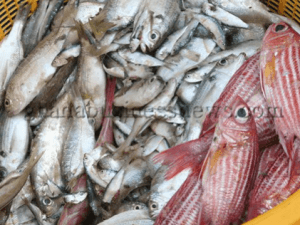How illegal fishing is destroying Ghana’s fisheries sector
 The fisheries sector is an important part of not only Ghana’s economy, but culture as well. There are generations of fishermen and women who process and sell fish. There are communities built solely on fishing, but the sector seems to have come under relentless attack from illegal fishing activities, chief among them the destructive method known as ‘Saiko’.
The fisheries sector is an important part of not only Ghana’s economy, but culture as well. There are generations of fishermen and women who process and sell fish. There are communities built solely on fishing, but the sector seems to have come under relentless attack from illegal fishing activities, chief among them the destructive method known as ‘Saiko’.
‘Saiko’ is a form of illegal fishing. It is the practice where industrial trawlers target the staple catch of small-scale canoe fishers and transfer it to specially adapted boats at sea for sale at local markets.
Every year, Ghana loses between $40 and $50 million through illegal fishing. It is reported that in 2017 alone, ‘Saiko’ scooped about 100,000 tonnes of fish, and these were sold at landing sites in the country. Some 80 per cent of that was reportedly landed at Elmina, the Central Region, also known as the hot spot for ‘Saiko’ activities.
Overall, illegal, unreported and unregulated (IUU) fishing is considered one of the biggest problems afflicting the sector.
Considering the fact that fishing provides jobs for more than three million people in Ghana, contributes 4.5 per cent to GDP and 12 per cent of the agricultural GDP, it’s importance cannot be over-emphasised..
Fisheries also provide 60 per cent of the animal protein need of the national diet with annual per capita fish consumption in 2014 growing to 28 kilogrammes.
Fishing communities in Ghana’s coastal areas are also coming under great pressure from the effects of climate change resulting in sea rise and coastal erosion, forcing many to flee from their ancestral homes, and the menacing consequences of illegal fishing is making their lives even more difficult. There are other illegal activities like the use of unapproved nets, light fishing and the use of dynamite in fishing which are worsening an already bad situation.
Some efforts are being made to address the situation, but a lot more ought to be done, and even drastically, as it is, foreign vessels, particularly Chinese owned vessels have been noted as main offenders in illegal fishing activities.
The situation has even attracted the interest of the United States authorities. The USAID through the Feed the Future Ghana Sustainable Fisheries Management Project (SFMP), a US government initiative, has been working hand-in-hand with the Ministry of Fisheries and the Fisheries Commission to implement a five-year SFMP project that is targeted at helping to rebuild fish stocks in the country.
The European Union (EU) has also added its voice in calling on the Ghanaian authorities to do more. The EU not long ago, made a call on the Ghana government to do everything in its power to end ‘Saiko’ before it destroys the fishing industry.
Fishing communities have over the time urged government to take action to deal with illegal fishing. Even though the Ghana authorities have given assurances multiple times that they are addressing IUU activities in the sector, they haven’t as yet won the confidence of the fishing community and observers.
The laws of Ghana are very clear on illegal fishing. For instance, the Fisheries Act 2002 and Fisheries regulations 2010 clearly prohibit ‘Saiko’. The authorities must show the will to at least curb the practice, to save the fishing industry.
By Emmanuel K. Dogbevi
Copyright ©2021 by NewsBridge Africa
All rights reserved. This article or any portion thereof may not be reproduced or used in any manner whatsoever without the express written permission of the publisher except for the use of brief quotations in reviews.
